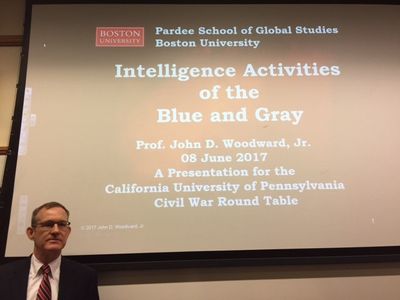Woodward Gives Talk on Civil War Intelligence
John D. Woodward, Jr., Professor of the Practice of International Relations at the Frederick S. Pardee School of Global Studies, was the guest speaker at the California University of Pennsylvania Civil War Round Table on June 8, 2017. He discussed Civil War intelligence activities.
At the war’s outset, the Confederacy arguably had an advantage because approximately twenty percent of West Point educated active-duty U.S. Army officers took up arms for the South, including Gen. Robert E. Lee, Woodward said.
The same was true with political leaders such as Confederate President Jefferson Davis. “Davis was the equivalent of a leading national security expert–he was a combat hero of the Mexican War, a former US Secretary of War and a US Senator,” Woodward noted. “By contrast, Abraham Lincoln had minimal military experience or knowledge and his one congressional term was most notable for his outspoken opposition to the Mexican War.”
“With one-quarter of the District of Columbia’s citizens being pro-Confederacy, and D.C. militias of suspect loyalty, from the Union’s perspective, the nation’s capital was riddled with spies,” Woodward said.
Because much of the Civil War was fought on Southern soil, Confederate forces had support from the local populace, which provided intelligence information about Union forces and activities, Woodward said.
As the war progressed, Woodward explained, Union intelligence improved via the Bureau of Military Information under Col. George H. Sharpe. “The BMI was a first rate intelligence organization that played a critical role at the Battle of Gettysburg,” he said.
Woodward, who writes extensively on intelligence and national security, stressed that “Both North and South ran sophisticated intelligence operations and networks which had a profound impact on the Civil War’s outcome.”
